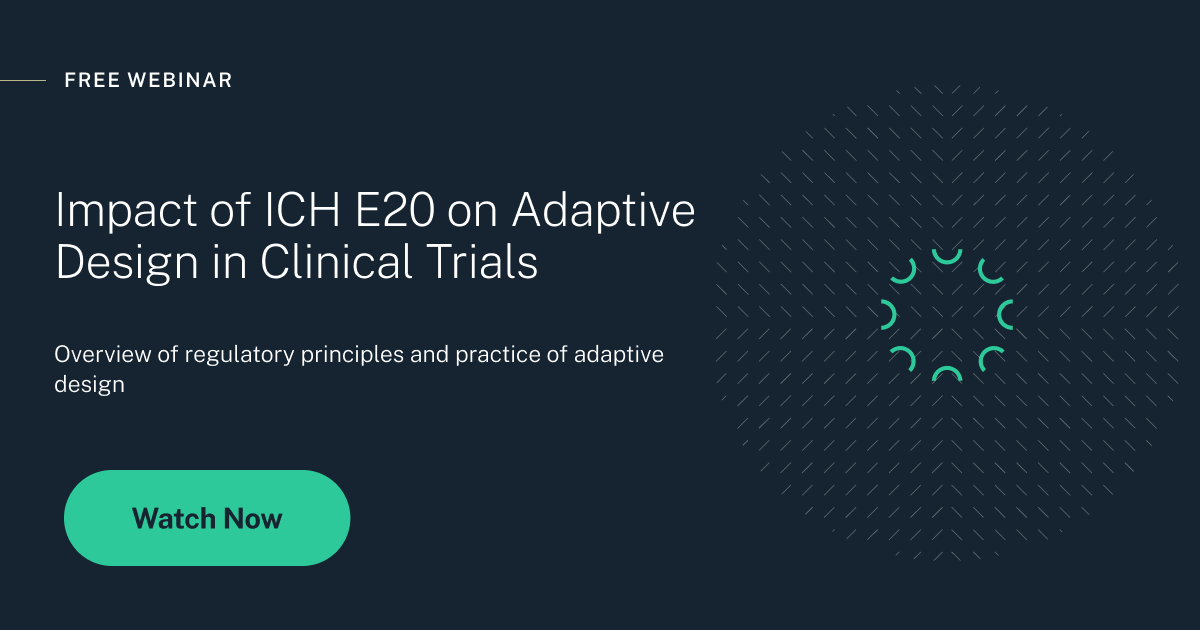What is the impact of ICH E20 on Adaptive Design in Clinical Trials?
- Survival Group Sequential Design.nqt
Webinar Playback:
What Are the Regulatory Principles and Practices of Adaptive Design Under ICH E20?
The draft publication of ICH E20 for Adaptive Design is a landmark achievement in the regulatory acceptance of adaptive designs in clinical trials. ICH E20 provides an overview of the key principles of adaptive design while providing an overview of the most common types of adaptations and also signposting some common areas of special interest (and potential future development).
In this tutorial, Ronan Fitzpatrick, Lead Statistician at nQuery, will prodivde an overview of adaptive design regulatory guidance, a breakdown of the key principles and design considerations covered in ICH E20 and provide a preview of areas which may potentially change between the draft and final guidance.
Learning objectives:
In this tutorial, you will learn how to navigate the complexities of adaptive design in clinical trials, empowering you to implement methodologically sound and regulatory-aligned studies.
Key Areas Covered:
1. What Is an Adaptive Design and Why Is Regulatory Guidance Important?
-
Understand the current regulatory landscape for adaptive designs, including the significance of the draft ICH E20 publication.
-
Recognize how a unified regulatory approach supports the appropriate use of adaptive designs and encourages consistent trial integrity.
2. What Are the Key Principles for Adaptive Designs under ICH E20?
- Learn the fundamental principles that ensure adaptive trials are well-designed, reliable, and answer clinical questions efficiently.
- Explore common types of adaptations such as early stopping, treatment selection, and sample size re-calculation.
- Understand special considerations including adaptive time-to-event trials, simulation methods, and Bayesian approaches.
3. Which Special Topics Does ICH E20 Highlight for Adaptive Designs?
- Identify areas highlighted for special attention or potential future development within the guidance.
- Recognize how stakeholders can contribute during the comment period to maximize the impact of the final guidance.
4. How Will ICH E20 Affect the Practical Implementation of Adaptive Trials?
- Understand how adaptive design can accelerate trials while maintaining scientific rigor.
- Appreciate how regulatory guidance helps ensure trials are both efficient and ethically sound.
Impact of ICH E20 on Adaptive Design in Clinical Trials
Overview of regulatory principles and practice of adaptive design
Adaptive designs allow pre-planned modifications to a trial’s course based on accumulating data, without undermining validity or integrity. The upcoming ICH E20 guidance represents a major step toward harmonizing international expectations for adaptive designs. It provides structure around their planning, conduct, analysis, and reporting — ensuring that flexibility does not come at the cost of scientific rigor.
This guide outlines how ICH E20 will influence the use of adaptive design in clinical trials, highlighting key principles, areas of focus, and implications for researchers and statisticians.
The Role of ICH E20
ICH E20 aims to promote a consistent, transparent framework for adaptive design implementation across regulatory regions. The guidance aligns existing best practices and introduces clearer expectations on when and how adaptivity can be applied.
It reinforces the need for prespecification, strong simulation evidence, and robust control of Type I error. It also emphasizes the importance of maintaining trial integrity through appropriate blinding, decision rules, and oversight.
For clinical researchers and biostatisticians, ICH E20 represents both an opportunity and a responsibility — enabling innovative, efficient trials while holding them to rigorous scientific and ethical standards.
Key Considerations for Adaptive Design
Adaptive designs can enhance flexibility and efficiency but also require careful control to ensure validity. Under ICH E20, sponsors must demonstrate that adaptive elements are prospectively planned, statistically justified, and operationally feasible.
Important considerations include:
-
Clear definition of adaptation types and decision rules.
-
Use of simulation studies to confirm performance and control of error rates.
-
Maintenance of blinding and independence in interim analyses.
-
Documentation of all planned adaptations and decision processes.
These elements are essential for regulatory confidence and scientific credibility.
Special Topics Highlighted in ICH E20
The draft guidance also addresses complex and emerging areas of adaptive design, including:
-
Bayesian methods, which allow probability-based adaptations and interpretation.
-
Time-to-event endpoints, which introduce unique challenges for interim decision-making.
-
Simulation approaches, required to evaluate design properties under multiple scenarios.
-
Treatment selection and dose-finding designs, which enable more efficient learning in early development.
These topics illustrate how the guidance seeks to integrate modern statistical innovation within a structured regulatory framework.
Practical Implications for Trial Design
The introduction of ICH E20 will shape how adaptive trials are designed, documented, and reviewed. Trial teams will need to ensure that adaptation plans are pre-specified, simulation-based justifications are comprehensive, and governance processes protect integrity.
Statisticians and study leads should also prepare for closer scrutiny of adaptation decisions, data access control, and reporting transparency. Planning early with ICH E20 principles in mind will reduce regulatory risk and support successful adoption of adaptive methodologies.
What Best Practices Should Biostatisticians Follow to Comply with ICH E20?
To align with ICH E20 and design effective adaptive trials, biostatisticians should:
-
Understand the framework and intent of ICH E20.
-
Identify which adaptive features align with trial objectives and operational capacity.
-
Incorporate robust simulation studies into trial planning.
-
Ensure decision rules and analysis plans maintain integrity and error control.
-
Document all adaptive procedures in accordance with regulatory expectations.
By adopting these practices, researchers can realize the efficiency benefits of adaptive design while remaining compliant with evolving global guidance.
About nQuery
nQuery helps make your clinical trials faster, less costly and more successful. So if you need something more than just a sample size calculator, nQuery is an end-to-end platform covering Frequentist, Bayesian, and Adaptive designs with 1000+ sample size procedures.
nQuery Solutions
Sample Size & Power Calculations
Calculate for a Variety of frequentist and Bayesian Design
Who is this for?
This will be highly beneficial if you're a biostatistician, scientist, or clinical trial professional that is involved in sample size calculation and the optimization of clinical trials within:
- Pharma and Biotech
- CROs
- Med Device
- Research Institutes
- Regulatory Bodies














